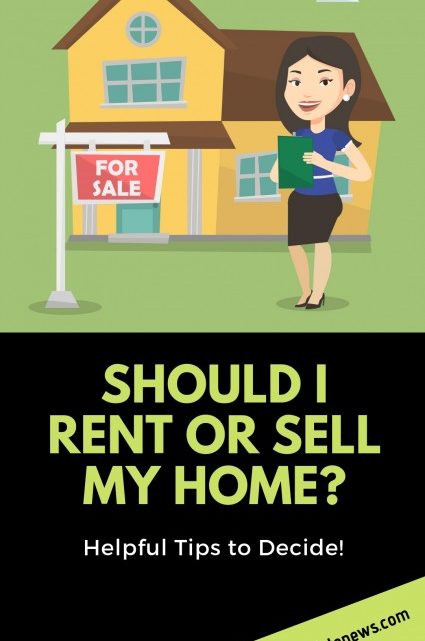Should I Rent or Sell My Home?
If you’re planning to move house, it’s relatively normal to think of selling your old house and purchasing a new one.
But this isn’t the only option. You might also be considering the possibility of renting out your old house and buying a new one, so you’ll end up owning two homes.
This is a possibility for more people than you might think. Even if you still have a large mortgage on your old home, it could still be worthwhile – so long as you can keep costs fairly low.
While there are plenty of agencies that will help you rent out a property, you can also do it yourself and save a potentially fairly hefty fee: just make sure you’ve written an excellent rental agreement that covers all the bases. You may also find that the other costs aren’t as high as you’re fearing – but it’s definitely wisest to work through these in detail before deciding whether to rent or to sell your house.
Let’s take a look at the case for selling and also the case for renting you home, to help you decide which is right for you:
 Three Reasons Why Selling (Not Renting) Might Be Best
Three Reasons Why Selling (Not Renting) Might Be Best
If you’re leaning toward selling rather than renting, there are definitely some benefits to be had:
#1: Selling Your House Keeps Things Simple
Renting out a house may not be much work … but it’s definitely some work. If you’re really busy, or if you simply don’t like dealing with admin, then you might want to stick with simply selling your house – that way, it’s no longer your responsibility at all! You can even get help from a real estate agent or a decent wholesaler to avoid any headache.
Selling your house also means you’ll only be keeping up with one mortgage, on your new property: you won’t have two separate mortgages to pay down. You also won’t have to account for rental income when you’re doing your taxes.
#2: You’ll Have a Large Down Payment for Your Next Home
Although this will vary a bit depending on your circumstances and how far you’ve got with paying off your mortgage, selling your home will almost always result in you having a sizeable down payment for the one you’re buying. This puts you in a stronger position.
Taking out a very large mortgage on the new home means you’ll end up paying quite a lot more over time (due to interest rates), so unless you already have a stack of money in the bank for a down payment, this can be a considerable reason to lean toward selling rather than renting out your home.
#3: You Can Escape a Dropping Market
If house prices are falling in your area, or if they’ve been flat for a while and you’re concerned they’re going to fall, selling makes the most sense. You won’t end up with a house that’s rapidly losing value.
This is obviously a tricky one to judge – none of us can predict the future! – but if you’re generally quite risk-averse and if you have reason to believe that house prices won’t be going up, or will only be rising minimally at best, then you might prefer to sell to get out of that housing market while you can.
Three Reasons Why Renting (Not Selling) Might Be Best
If you’re considering renting out your old house rather than selling it, there are several benefits:
#1: You Can (Hopefully) Make a Nice Profit
So long as the rental income on your old property more than covers the mortgage plus all expenses, taxes, and so on, you’ll be making a profit each month. This may not be super-high, but it’s mostly passive income – especially if you hire an agency to rent out your property for you.
It’s essential to think through all the expenses associated with renting a home, though, from repairs to maintenance to your tax bill. Also, don’t assume that you’ll be able to have tenants in place every month of the year – you’ll likely have some gaps between tenants.
#2: You Could Move Back to Your Old House in the Future
Let’s say you’re moving to a new city for a new job, away from family and friends. If you decide you want to move back (or if a temporary contract comes to an end), then you can simply move back into your old house.
Obviously, you’ll have renters in the house, so you’ll need to provide an appropriate amount of notice to them (and there’s also likely to a minimum period – e.g., six months or a year – that they’re entitled to stay).
#3: You Can Benefit from Rising Property Prices
If the property market continues to do well, your old home will continue to rise in value. This means that – so long as the rent is more than covering the mortgage – you’ll not only have a small month-by-month income from the house, you’ll also end up with two houses (your old one and the new one) that are both gaining value for you.
Even if you’re planning to rent out your old house and rent a new one for yourself, this could still be a significant benefit if you’re going to be renting somewhere with lower property prices than your original location.
Do keep in mind, however, that you may need to pay capital gains tax when you sell the property. (For some ways to reduce this, check out Investopedia’s advice here.)
Ultimately, it’s up to you whether you want to sell your house or rent it out.
Selling is the “default” choice for most people and means you do not have to keep up with two mortgages (or a mortgage on the old house plus rental payments on the new one), and you don’t have the hassle of being a landlord.
Renting, however, provides a reasonably passive monthly income stream, and (if property prices rise) potentially gives you an outstanding payout when you eventually do sell the property.
Keep in mind that whether you opt to sell or rent, you may still be in for some upfront work. Both ways, you’ll need to make sure your house is in good repair: you won’t achieve a sale at the price you want or land a good tenant if you’ve got paint flaking off the walls and a dated kitchen or bathroom.
Final thoughts
Selling or renting your home is a big decision. You should always will the pros and cons carefully before making a final decision on which option is best for you or your family.
Other Helpful Real Estate Articles Worth a Look
- Repairs to make before you sell a house – see four repairs/improvements that are wise investments to make when selling your home. These improvement have a great return on investment.
- Helpful home selling articles – see an excellent roundup of exceptional real estate articles from top experts offering great advice when it comes to selling a home.
Read these additional resources for more solid advice to help make smart real estate decisions.
About the author: The above article on selling or renting your home was written by Erika Rykun. Erika is a content strategist and producer who believes the power of networking and quality writing. She’s an avid reader, writer, and runner.











No Comment